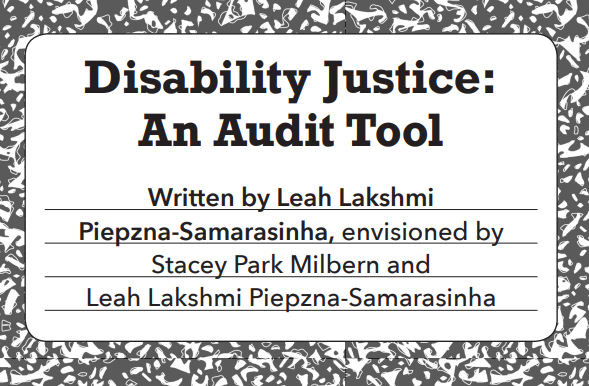I recently downloaded Northwest Health’s “Disability Justice: An Audit Tool” at https://www.northwesthealth.org/djaudittool# – it is a quick, free download. From the website their description:
Disability Justice: An Audit Tool” is aimed at helping Black, Indigenous and POC-led organizations (that are not primarily focused around disability) examine where they’re at in practicing disability justice, and where they want to learn and grow. It includes questions for self-assessment, links to access tools, organizational stories and more.
While white facilitators aren’t the target audience, this is a terrific and more broadly useful piece. For me it stems from Intersectionality, one of the ten principles of disability justice. Intersectional work is one of the essential practices we all need to learn and use, especially those of us who call ourselves facilitators. While the checklist is organizational oriented, it is great food for thought and ACTION.
First, what is disability justice? From the tool:
Disability justice is a term and a movement-building framework (i.e. a way of envisioning the ways people can organize around and think about disability) that centers the lives and leadership of disabled Black, Indigenous and people of color and/or queer, trans, Two Spirit and gender nonconforming people.
Disability Justice: An Audit Tool
To paraphrase Patty Berne, disability justice leader and co-founder of DJ performance and political collective Sins Invalid, disability justice steps into the “cliffhangers” left over from the disability rights movement.
I was particularly taken by Patty Berne’s description about the cliffhangers left oer from the disability rights movement. It make me wonder about how we overlook something because we are focusing on something else we think is important. I reflect upon my feminism as a white woman and how it so thoroughly distracted me from racism for so long.
If we are not intimately involved in the issues of disability rights, we can forget about it. Time for action.
The action I put forth to myself is to read, journal and reflect upon the tool to identify first where I have an am falling short on disability justice in my life and work. It has been gratifying to see how many people have started to pay attention to things like access issues in online meetings, so that opens the door a crack for more and more fundamental changes. The checklist can help me go deeper. Thanks, NW Health and all the individuals who created this tool.
